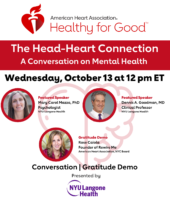 People often think that mental health is solely about how we feel, but mental health includes our emotional, psychological, and social well-being. It can effect how we think, feel and act.
People often think that mental health is solely about how we feel, but mental health includes our emotional, psychological, and social well-being. It can effect how we think, feel and act.
World Mental Health Day is on Sunday, October 10th and in honor of that day dedicated to raising awareness of mental health issues, the American Heart Association is hosting a special conversation presented by NYU Langone Health.
Mental Health and Heart Health: 
For years, doctors thought the connection between mental health and heart health was strictly behavioral – such as the person who is feeling down seeking relief from smoking, drinking or eating fatty foods.
That thinking has started to change. Research shows there could be physiological connections, too. The biological and chemical factors that trigger mental health issues also could influence heart disease. Learn more…
Have you ever felt hangry (hungry + angry)? Food and mood have an effect on one another. Understand how they interact so you can make good diet choices and avoid emotional or impulse eating.
Maybe it’s no coincidence that food and mood are just a letter apart; the two are peas in a pod. Think about it: you stick to a giant dinner salad on a “winning it” kind of day, and reach for a tub of ice cream after a bad date or a frustrating day at work. Learn more…
Could yoga be the missing piece to your whole body health puzzle? Many people experience increased energy and lower stress when practicing yoga regularly.
Most people experience increased energy and an improvement in overall well-being as physical activity becomes routine. Studies have shown that regular physical activity can help relieve depression and may even lower your risk of developing it. Learn more…
Kids’ Physical & Mental Health Infographic
How Does Depression Affect the Heart?
When you’re feeling down, it’s easy to reach for your favorite comfort food or skip a workout. But thinking about your heart health is important, even when you’re not feeling too chipper.
When people are stressed, anxious or depressed, they may feel overwhelmed, so they’re not apt to make healthy lifestyle choices. They may be more likely to smoke more, not be physically active, sleep too little or too much, drink too much alcohol and fail to take their prescribed medications. Over time, these unhealthy behaviors can increase the risk for heart disease. Learn more…
How to Break Bad Habits and Change Behaviors
Old habits can be hard to break, and new habits hard to make, but with these six basic steps you can develop new, healthy behaviors that stick. Learn more…
Can Your Pet Help You Be Healthier?
Besides the obvious value of a good snuggle, what’s the connection between pets and our health? Studies have shown pet ownership may help increase fitness levels, relieve stress, lower blood pressure and cholesterol levels, and boost overall happiness and well-being. Pets also provide social support, which is an important factor in helping you stick with new healthy habits.
It’s no surprise that people who walk their dogs are more likely to get the recommended amount of physical activity than those who don’t. One study found that pet owners who walk their dogs got up to 30 minutes more exercise a day than non-walkers. Learn more…
Thankfulness: How Gratitude Can Help Your Health
Gratitude is more than a buzzword. It’s a habit and practice that may actually change your perception of well-being.
Some neuroscience experts think our brains focus on negative information as a way to remember pain so we can avoid it in the future. They call this the “negativity bias.” To balance out this natural tendency, we can practice gratitude. Learn more…



